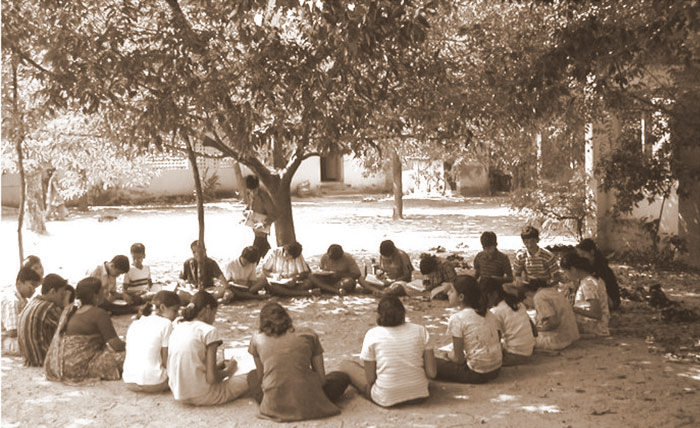A few years back, an internationally renowned researcher told me, “Now-a-days, I don’t teach directly. My lectures are recorded. I play one of them and sit comfortably in the class. Students see the video in the classroom in my presence for 50 minutes, and I answer their doubts (if any) in last 10 minutes of my lecture. So I get 50 minutes more to work on my research papers, and I do save a lot of time in preparing for the class”.
I was surprised, and I immediately recalled that as a student, I had developed a dislike for certain teachers who used to carry yellowish notes to the class and used to repeat the same lectures year after year.I wondered whether modern technology is going to develop a similar kind of dislike and boredom among the students.
The present situation and the online teaching are making this question relevant. Further, my students told me that if the lectures are recorded (be it NPTEL or a Zoom-based class or recorded and uploaded on YouTube), they don’t need to attend it in real time; they can listen to them at any time convenient to them. Perhaps this is of help in some sense.
Technology is now allowing a student living in Ghana or Bhutan to listen to a series of lectures delivered at Satanford University or Oxford University, but is it a journey towards equality? Perhaps its not. To be precise, in India how many students have laptop and smart phones with substantial amount of memory? Is the present situation (where definitely online teaching seems better than no teaching) creating a social inequality among the students having resources like good phone, good network and good laptop with those who do not have these resources? These questions are disturbing me as a teacher and as a citizen, but I am continuing my experiment with online teaching, and in what follows, I share some other aspects of that journey.
Apart from those who used to repeat their lectures year after year, we had other teachers who never knew where they will end a class. For example, a teacher while teaching atomic physics realized that we were weak in quantum mechanics, and he started working on our foundation of quantum mechanics. Soon he realized that some of us have difficulties in mathematical physics required to understand quantum mechanics and he taught us that, too.
Those teachers, their oratory skills, wisdom, sincerity and a personal touch motivated many of us to become teachers. All learners want to mimic people they like, be it a baby or PhD students. I was not an exception. So I wanted to become a teacher with the qualities of the best teachers who taught me. In an effort to mimic them and in the process of doing the mimicking job for two decades, I have developed my personal definition and perception of teaching. To me teaching is a performing art, where a teacher needs to perform every day in front of his/her students. He/she needs almost all skills of an actor/actress of a stage play (and a bit of skills of the playwright also as here he/she has to write the scripts, too). Specifically, if a teacher speaks continuously in the same pitch, students feel sleepy, so one needs to do voice modulation; one also needs appropriate hand movements and sometime movements of other objects available in the class like a duster or a chalk or a copy and a pen to explain ideas; one needs to keep the listeners’/viewers’ attention intact by cracking some related jokes, talking about historical development of the topic like a story or taking a break for interaction. Till the beginning of March, teaching was a live and interactive performance for me, where my next sentence used to depend on what impression I saw in the faces of my students after my previous sentence. Interaction is not always through sentences, it’s often visual – interpreted with the help of experience. This is how we have been trained, and suddenly the present situation has turned us into TV actor/actress who performs without looking at their viewers. While I switch on my slides or notes in Zoom or Google meet or Microsoft team, I see only that in my monitor, I stop seeing the faces of my young listeners, my skill of guessing whether they understood it, whether I need to repeat a topic disappears immediately. I become part of a new system, a learner who does not have good models to copy, a kind of self-learner. So for last two months, I am learning to become a TV actor from a stage performer.
In the process, I have used various platforms like Google Classroom, Google Meet, Zoom, Dropbox to share files, WhatsApp to make group, each has its own advantages and disadvantages, but I am not interested to discuss those technicalities. Rather, I would like to list a few disturbing questions in addition to those mentioned above: Will it considerably affect eyesight of the students? Students of any place can now listen to lectures of any university. This may have interesting implications, we have to improve ourselves to the level of the best teachers of the same subject in the world, but everyone cannot be the best. So students of a class will listen the best lectures and his assigned teacher/professor may eventually turned into a TA who usually conducts tutorials. It may be a challenging time for many teachers, especially for those who does not have any creative perspective of his own about the subject. Challenges that are coming seems to be manifold as after an age, many teachers may found it difficult to transform their skills in line with the present technology and demand. Will following Darwin’s theory of survival of the fittest, many experienced teachers with deep knowledge of the subject, but limited knowledge of technology disappear? If it happens, that will be very bad for future.
Finally, the disturbing question is: how to conduct examination in the present situation. In all discussion, teachers are always finding out some loopholes in online test that will allow students to cheat. This is true that online tests given from home cannot be made loophole free, but what bothers me more is the fact that despite so many failures we can trust banks, we can trust our political leaders, we can trust city administrators- why cannot we trust our young students?
If we cannot trust them for an hour for an online test, then what have we taught them for so many hours? If I cannot trust my students for an hour, then perhaps I cannot justify my existence as a teacher. Let’s trust them, love them and be with them in this difficult time. That’s the only thing teacher can do in this time of transformed teaching and learning and hope that this journey will be over soon and the students whom we are teaching now will be free to move in a beautiful world in the upcoming future, and we will also be able to enjoy our teaching in the interactive mode in a classroom full of young minds.
Professor Anirban Pathak is a theoretical physicist. At present he is a professor of Physics at JIIT, Noida. He is actively involved in teaching and research related to several aspects of quantum physics and science popularization activities. He is a recipient of 2017 Shri O. P. Bhasin Award in the field of Electronics and Information Technology.











